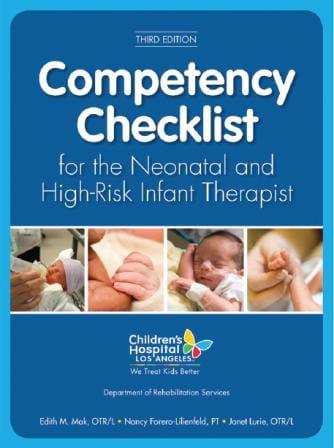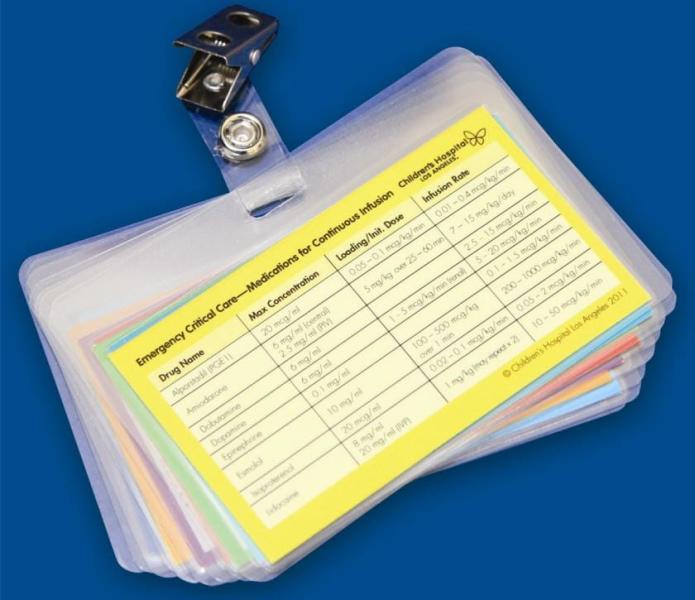Copyrighted Products
The products for sale below were developed by our health care practitioners and community researchers to help other health care professionals, educators and families. These products include curricula, workbooks and videos.
Details on Making Purchases Online
Bulk orders may be placed via Email.
Payment Types Accepted
Check: Checks should be payable to "Children's Hospital Los Angeles"
Mail checks to:
Children's Hospital Los Angeles
Attn: Office of Technology Commercialization
4650 Sunset Blvd., #84
Los Angeles, CA 90027
Products
Competency Checklist for the Neonatal and High Risk Infant Therapist
Created by: Edith M. Mak, OTR/L, Janet Lurie, OTR/L and Nancy Forero-Lilienfeld, PT
Children's Hospital Los Angeles, Division of Rehabilitation Services

This training manual was developed for occupational and physical therapists who are beginning practice in the neonatal and high risk infant care units and acute outpatient area. The Checklist is intended to be a set of guidelines and an objective tool used to measure, train and monitor the clinicians' advanced competency skills. It assesses areas of competency in evaluation, treatment intervention (including neurobehavioral development), feeding skills, family training and interdisciplinary teamwork and discharge planning.
The Checklist is divided into three major sections:
- Chart Review
- Assessment
- Therapeutic Intervention and Feeding
Also included are a pre-test, open and closed book examination, test questions and answer key and reading and reference list.
Price: $75 + S&H
ED Code Cards
Created by: Calvin Lowe, MD

This badge-size reference guide provides pediatric critical care medical information to the emergency medical provider in an easily accessible and legible fashion. The guide is designed to take into consideration the special biological and developmental requirements of children, including the neonate. This referral tool will be useful to emergency medical technicians, emergency medical physicians, nurses and emergency room attendants.
The unique feature of this product is the instant access to the user (emergency medical technicians, emergency medicine physicians, nurses and emergency room attendants). It is designed to be carried by the user and the information is provided in an easy to read format. Each set consists of eight double-sided color quick-flip reference cards.
Price: $25 + S&H
Buy Now
HEADSS: An interview protocol
Created by: Ellen Iverson, MPH
HEADSS is a unique psychosocial program developed for use with adolescents. The goal of the program is to provide specific information to allied health professionals on how to intervene and discuss such topics as sex, suicide and drug use. The program includes a workbook and video that guide the professional through the process step by step. The workbook is designed for counselors, psychologists, therapists and social workers.
This product is exclusively available through Films for the Humanities & Sciences and may be ordered here.
Kids N Fitness
Created by: Francine Kaufman, MD
Kids N Fitness is a 6-week weight management program for overweight children and their parents. The 1.5-hour weekly classes are divided into interactive nutrition education, exercise and parent seminars. The goals of Kids N Fitness are to:
- Reduce weight gain in overweight and obese youth
- Promote healthier eating habits, more frequent exercise, and a reduction in the behaviors that encourage weight gain
- Provide ongoing support to help sustain healthy behaviors
The program is available to hospitals, health clinics and after school programs upon securing a license from Children's Hospital Los Angeles. Children's Hospital Los Angeles will provide instructor manuals (designed for health educators, teachers and dietitians) with complete curriculum, 8 hours of training, sample of incentives and updates thereof for a two-year period.
For pricing information, please contact:
Ms. Megan Lipton-Inga
MLipton@chla.usc.edu
323-361-5423
Peer Mentoring Program
Created by: Ellen Iverson, MPH
Facing the Challenge: Building Peer Programs for Street Youth was developed for high-risk adolescents and raises the seldom discussed, important issues related to developing and managing peer programs. The program includes a workbook and video and is designed for the service provider.
This product is exclusively available through Films for the Humanities & Sciences and may be ordered here.
Project AIM (Adult Identity Mentoring)
Project AIM is a CDC-endorsed program created to reduce sexual risk and substance abuse risk among youth.
Created by: Dr. Leslie Clark
Intervention Description
Project AIM is a group-level youth development intervention designed to address risk trajectories, emergence of environmental risk and the debilitating effects of poverty and racism. The intervention is based on the Theory of Possible Selves, which states that a person’s motivation is determined by a balance of positive and negative ways people see themselves in the future. Individuals who are able to imagine both possible positive and negative futures are more likely to work toward their life goals and achieve future success. Thus, Project AIM encourages at-risk youth to imagine a positive future and discuss how current risk behaviors can be a barrier to a successful adulthood.
The goals of Project AIM are to provide youth with the motivation to enact safe choices. Students are able to explore theories of their possible selves:
- What one might become (hopes)
- What one would like to become (goals)
- What one is afraid of becoming (fears and threats)
The curriculum consists of the following four units:
- Legacy, Role Models and Peers
- Self-Projection: Expanding Visions of Possible Selves
- Self-Expression Through Work: A Positive Self
- Skills for Fulfilling Positive Future Selves
Target population: At-risk adolescents
Research Results
Project AIM was tested in schools among African-American seventh grade students in a suburb near Birmingham, Alabama. At 12 weeks after the intervention, youth participating in Project AIM compared with youth not receiving the intervention reported the following outcomes:
- Increased abstinence
- Decreased intention to engage in sex
For Details on the Research Design
Clark, L., Miller, K., Nagy, S., Avery, J., Roth, D., Liddon, N., et al. (2005). Adult identity mentoring: Reducing sexual risk for African-American seventh grade students. Journal of Adolescent Health, 37, 337.e1–337.e10. For more information, click here: Centers for Disease Control and Prevention.
For more information, please contact:
Aim Services Core at aim@chla.usc.edu
Frances Cordero at fcordero@chla.usc.edu or 323-361-4605